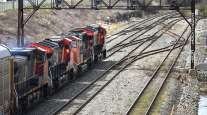Union Pacific Agrees to Inspection, Maintenance Improvements

The resolution between the two entities came about Dec. 23.
“I’m encouraged by the Federal Railroad Administration’s announcement that it will require Union Pacific to increase its track maintenance, inspections and training following its investigation into the Mosier, Oregon, derailment,” said Washington Gov. Jay Inslee. “The incident could have been much worse, and demanded an increase in safety measures by Union Pacific.”
Following the Mosier derailment, inspectors found that faulty bolts along the line caused the train to derail. In response, federal regulators are now calling for twice-per-week track inspections and walking track inspections four times a year.
“This agreement acts on the specific concerns I raised with [Federal Railroad Association] Administrator Sarah Feinberg in June, including the need for walking track inspections necessary to find the type of defects that caused the Mosier derailment,” said Inslee. “Administrator Feinberg deserves credit for taking these steps to keep communities safe in Washington, Oregon and across the country as volatile crude oil is hauled across our rail lines. The compliance agreement should be viewed as a minimum effort for any railroads that move crude oil.”
The announcement was made the same day Feinberg released a statement that her agency’s enforcement of federal rail safety rules had led to the highest-ever civil penalty collection rate in the agency’s 50-year history, surpassing last year’s record-breaking rate. For fiscal year 2016, the agency expects to collect 79% of the civil penalties it issued to railroads, hazardous materials shippers and others for violating federal safety regulations, a 4% increase over 2015, and the largest percentage rate ever closed by the agency. The total amount of civil penalties in 2016 hit $15.75 million, more than a half-million more than the previous year.
Last year, more than 6,268 railroad company violations resulted in civil penalties.
“The country continues to rely on rail more and more to transport materials and people, and that must happen each day without an incident,” said Feinberg. “A strong enforcement program is a critical element to achieve that goal.”




